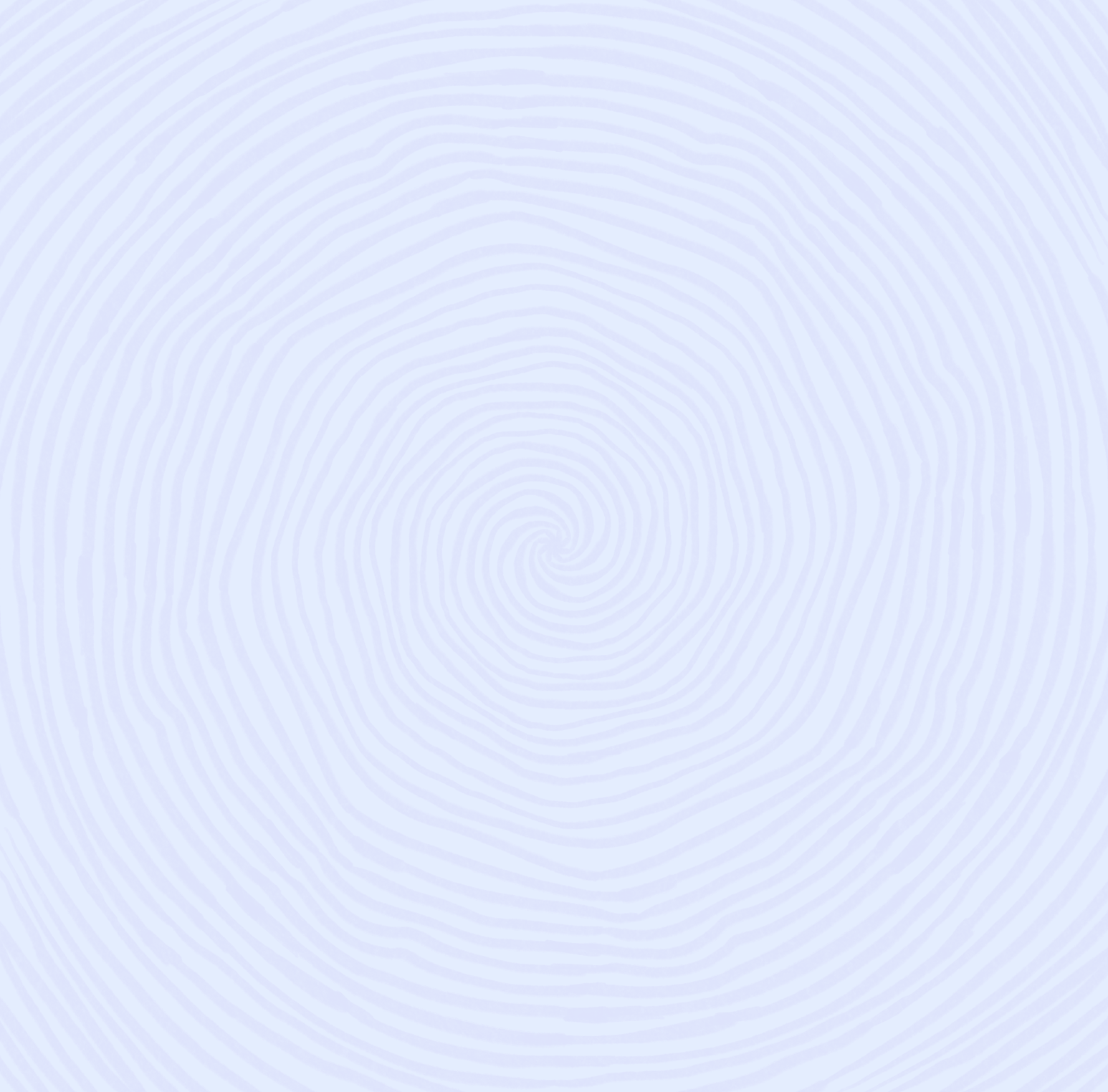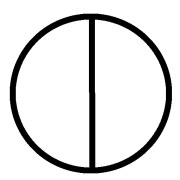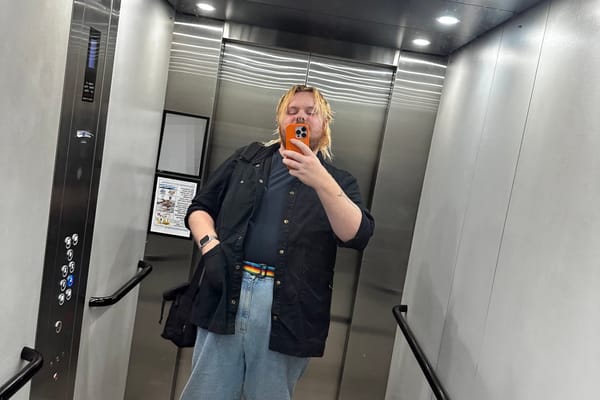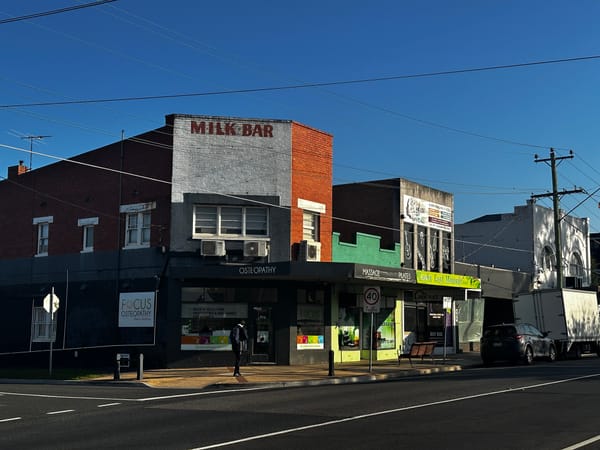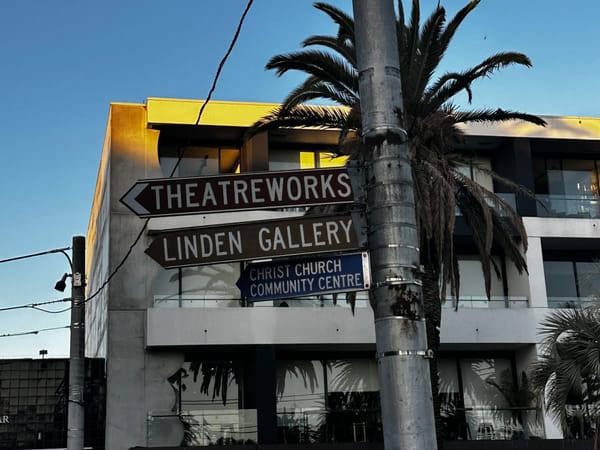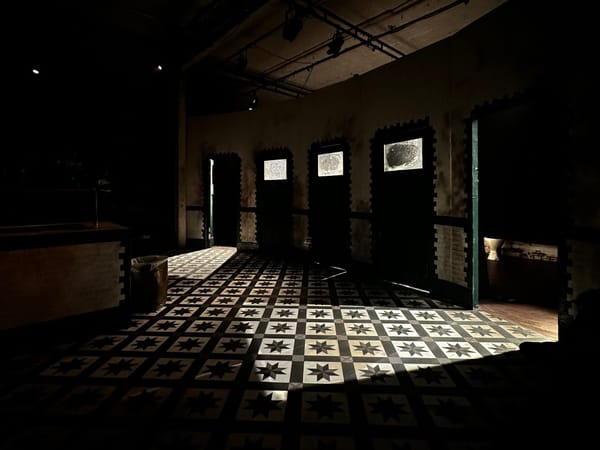🌀 10: What To Abandon and When To Abandon It
Fourteen comedy festival reviews, reflections on queer ancestors, climate art, and the cruelty of AI, plus more investigations into using chatbots for theatre.
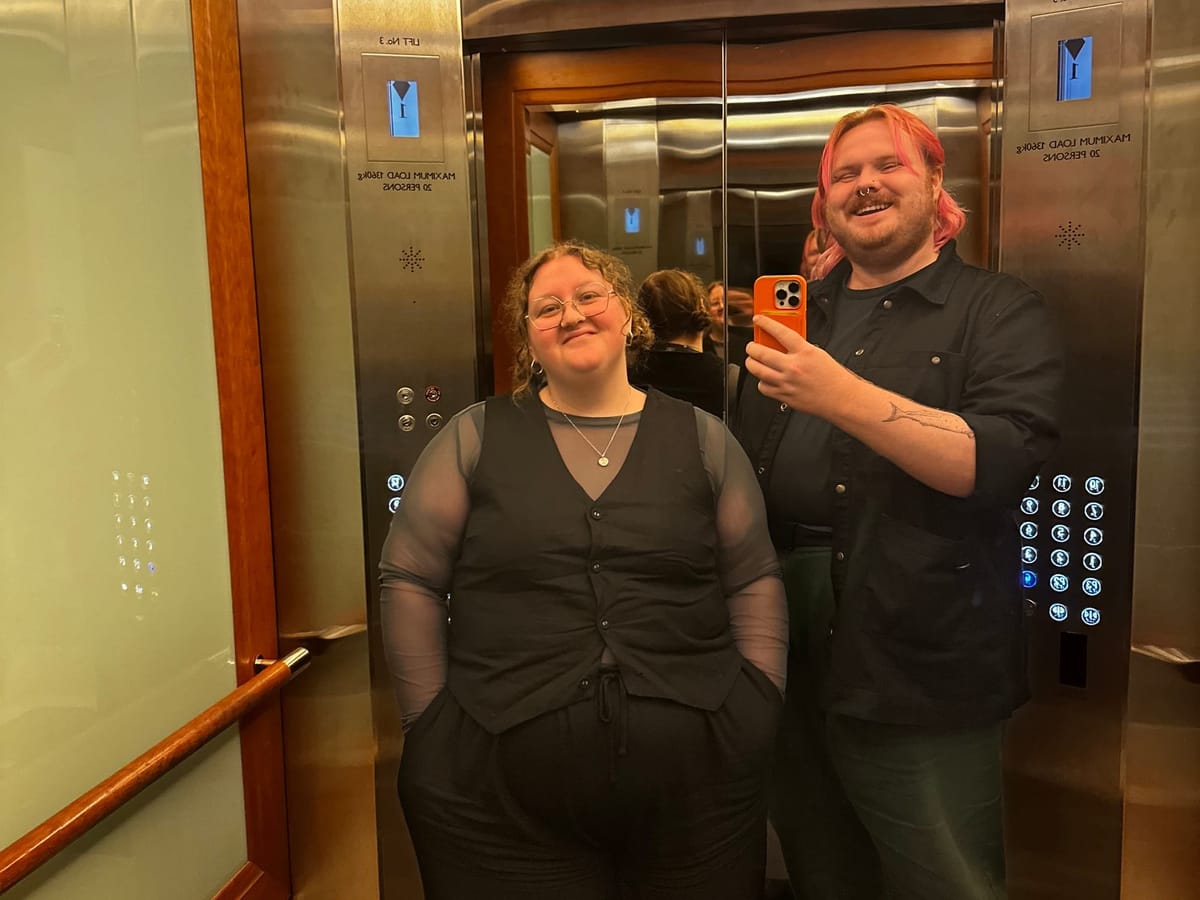
I am deep in the thick of Comedy Festival and life is goooodddd.
I love this stinking festival, I love cramming into seats far too tiny for my ass, I love comedians trying to find new ways to say new things, I love comedy which fails but makes me think anyways, I love eating the very last tempura veggie roll from the Sushi Hub on Swanston Street while rushing to a 10pm show at the Butterfly Club. I love seeing comics engorge themselves on midnight crepes outside the festival club, I love laughing and I love being too tired to laugh anymore. I love when sets turn serious right at the end and I love comedians trying to out-Nanette Nanette. I love seeing all the different crowds different acts pull and I love slipping and out of them like a pink chameleon. I love scribbling meaningless words in a little diary and I love seeing what’s next and what’s new.
Comedy feels like such a breath of fresh air—like I spend the whole year thinking about theatre and for one glorious month I get to laugh and revel in art made just to make me laugh. Or laugh, then think. Or think, then laugh. Whatever. It doesn’t matter. Or it matters so much. It’s joyous and lovely and the cold weather has hit and the world is goooddd!
This newsletter contains about 14 festival reviews + some gorgeous links on climate change (where this week’s newsletter title is taken from), queer ancestors, and the cruelty of AI + a little update on Georgie & I’s chat-bot-theatre-project.

In the first week of Melbourne International Comedy Festival I’ve seen fourteen shows—and attended one panel at Melbourne Theatre Company. Below you’ll find notes on all of them (wow I love MICF, truly one of Narrm’s greatest cultural assets).

Swan? from HEYwire Theatre was the first show on my MICF program and what a strong opening number! Created by Canadian clown Lauren Brady, Swan? is a loose solo retelling of Swan Lake about gender roles and patriarchy—underscored by a brilliant physicality, immaculate audience work, and an ultimately gut-wrenching narrative. Hilarious and impeccable clowning which you should absolutely consider seeing.
Promising Young Mensch by Jacob Sacher is a surreal alternative comedy about moving on from childhood abuse. Sacher plays a heightened version of his younger self explaining his religious upbringing and playing in outlandish ways—strapping a TV to himself to play cricket with the audience. It’s full of whimsy until it’s final moments where like Hannah Gadsby’s Nanette (a comparison Sacher makes himself) it pulls together into a searing indictment of the way we fail young people—a tonally abrupt ending which underscores legacies of abuse.
Delusions and Grandeur by Karen Hall is a peek behind the curtain of symphony orchestras—at the lives and tribulations of professional instrumentalists. Delusions is half cello concert and half stand-up routine, exploring her career, its precarity, and what performance takes from you. Hall is a seasoned performer and engaging storyteller who confidently traverses storytelling, comedy, and cello with aplomb.
Don’t Let Me Eat My Babies by Holly Bohmer is a whirlwind hour of character comedy, (very) loosely exploring womanhood. Bohmer‘s characters are lurid reflections of patriarchy performed with exceptional comedic sensibilities. Whether Bohmer is playing an overly-spirited cloaca salesman or a Year 9 girl far too active on Tumblr, her assured physicality brings them to life. This is a well-rounded set of sketches well worth seeing.
Feminist Trash by Sugar Bits is a polished evolution of their earlier work—a mix of musical comedy, slapstick, and sketch unified by a broad examination of contemporary feminism and patriarchy. Sugar Bits’ music production is poppy and slick although on a technical note the sound levels were a bit out of whack the evening I attended. The trio’s stage presence is brash and commanding and I left the show feeling like I’d just walked out of a pop concert—it’s addictive and totally fun.
Pope Benedict IX by Pedro Cooray tells the true story of the first gay pope. Cooray plays an assortment of historical figures charting the twunk pope‘s life-and-times including his affinity for orgies, murder, and political corruption. It’s a fascinating story told in a unique manner although Cooray’s character work left something to be desired. I enjoyed the imagination and presence Cooray displayed in the work and left entirely obsessed with a new religious figure.
Bunker by Jett Bond is a participatory comedy show set in a bunker after a zombie apocalypse. Set in the basement of Bard’s Apothecary, Bond spends the hour talking to and riffing with the audience about the life we‘re about to lead together underground. It’s a very loose and fluid set which could go horribly wrong with the wrong crowd, but to Bond’s credit it works, using his stellar buffooning to remember the world we’ll miss. I only wish he took it further—immersing us deeper into this new world and enlisting us to help rebuild.
I Can’t Tell What She’s Saying riffs on British comedian Rosie Jones’ cerebral palsy. Her set plays continuously with the expectations the audience has of disabled folks, undercutting stereotypes with a persona that is thoroughly horny, self-obsessed, and rowdy. Jones jokes that there’s no reason she couldn’t do her set drunk because it’s not like able-bodied folk would be able to tell the difference. Her offbeat personality and anecdotes make solid company for an hour.
Mad C*nts is a debut hour from duo Madi Chetcuti & Maddison Verduci exploring contemporary female friendship and generational differences between Zoomers and Millenials. Chetcuti and Verduci are a well-matched pair who effortlessly connect deeply with the audience as they take us on a journey to find out what it takes to become an iconic duo. The show’s humour stems in part from an endless barrage of pop culture references from the past decade which begins fun but wears thin towards the conclusion, although the pair’s total commitment to the bit is delicious to witness. An exciting comedy fest debut which left me keen for future work from the duo which might be a little more off-the-cuff and from the heart.
No Show by Jett Bond & Thom Heim is a late-night hour exploring what might happen if a comedian never showed up for their set. Extending upon Bond’s work in Bunker, No Show is improvised with the audience as we respond to the lack of a show. This is incredibly brave comedy which pushes beyond what Bunker achieves to build a genuine sense of co-creation with the audience—maybe it’s the late night slot, maybe it’s the more rigid structure which encourages the audience to participate? All I know is that at one point I logged into my binge account during the show and as an audience we almost booked a flight to Athens—truly one of the most structurally unique and exciting shows I’ve seen in the festival. Proceed with an open mind though, as results may vary.
Jude Perl Tries to Finish a Sentence is a really lovely and fun cabaret hour exploring ambiguity and the potency of not knowing in a world which constantly demands neat answers. Lovely melodies and soul-baring lyrics enmesh as Perl takes us through a mockumentary on their attempt to say something—one single thing—without undercutting it or qualifying it. It’s really fun and provoked in me an appreciation for the messiness of communication and how it may be an opportunity for us to connect.
Fresh New Worries by Gillian Cosgriff is a gorgeously constructed exploration of our age of worrying. Cosgriff tries to find common ground between us, reflecting on the fears and anxieties that connect us all. Her musicianship is immaculate as is the story she weaves of Pandora’s box and the possibility that hope may’ve been the worst thing in there after all. So instead then, Cosgriff reflects, maybe it’s the fact that we worry so much that matters most—because to worry is to care, and at least that’s one way to escape apathy.
Garage Sale by Alanah Parkin is a debut solo hour of character comedy following a single garage sale and the supernatural mishaps behind this domestic life. The plot is pure fun, featuring Christina Aguilera, disappeared daughters, and a generational secret which unravels in the most satisfying way. Parkin is a strong and self-assured performer who brings the most out of these motley characters, although the show’s pace is hampered by lengthy costume changes. A satisfying debut from an emerging talent.
The White Powder That Changed My Life by Annalise Knight is a story about Knight’s experience with Post-Concussion Syndrome following a skiing accident. Equal parts lecture on brain injuries, indictment of the way the arts fail folks with disabilities, cabaret, and stand up set—it’s an hour of material which constantly shape-shifts into new forms and reveals the importance of looking after our heads. While Knight is an engaging and multi-talented performer with a lot to say, the show doesn’t always strike the right balance between it all.

Radical Then, Radical Now at Melbourne Theatre Company was a panel on radical theatre-making practices throughout the past fifty years in Narrm. While it was lovely visiting the Sumner and hearing excellent thoughts from Anne-Louise Sarks, Caitlin Dullard, Alison Croggon, Andrea James, and Mark Wilson, I left feeling a little apathetic.
At one point the conversation turned to the power of theatre (and art) to communicate ideas we can’t say. Croggon specifically mentioned Shakespeare productions in the USSR as a way of critiquing power indirectly, which Sarks then compared her programming of The Removalists to—describing it as a show which is able to critique why we turn to violence for so many issues.
It felt like as a panel they were very explicitly avoiding mentioning the P word and look; obviously I understand the material reasons that arts organisations aren’t saying Free Palestine publicly and with their full chest (case in point: the ongoing silencing of Khaled Sabsabi), but still… it’s completely infuriating to witness.
How can you claim to carry the mantel of radical art-making if you can’t publicly denounce a genocide? Just makes me a little hopeless you know.
That aside, it was pretty interesting to hear from Sarks about the thinking that goes into programming work at MTC and from Dullard about what she sees La Mama’s role in Narrm’s theatre ecology as.

Ever since I read Kill Climate Deniers in my first year of university I've been obsessed with everything David Finnigan writes, and that's no different when it comes to this overview of where he thinks the next five years of climate art will take us.
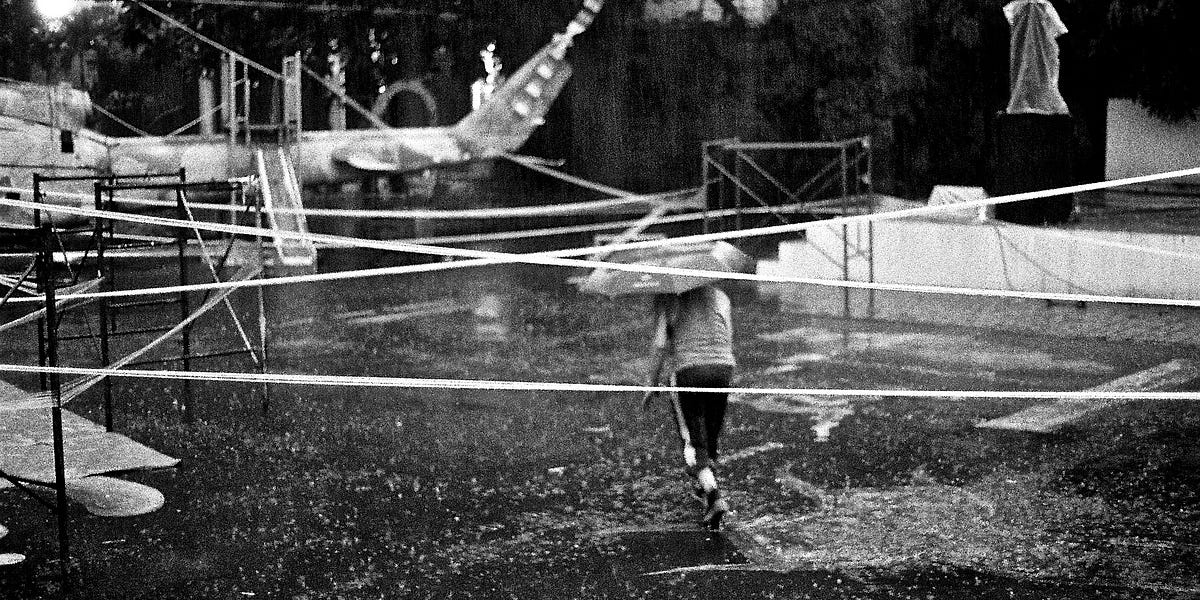
He zeroes in on four big threads which will become the stories of climate change, including a particularly poignant one I've been thinking about in regards to the Gold Coast post ex-Cyclone Alfred:
The conversation about what to abandon, when to abandon it, and how to negotiate the accompanying pain and grief will be one of the defining experiences of the coming generation. I want more stories that dig into this.
Sometimes on the edges of my imagination I've dared to imagine what a world would look like where you and I leave the coast and run for the hills—maybe to Canberra—and god it's terrifying. I actively don't want to think about it, so I'm glad Finnigan is drawing attention to it, because like it or not it’s something I’m going to need to confront this decade.
Another thread is that of China's role in all of this:
If the protagonist of a story is the character who changes the most, who creates change in their path, then in political terms, the protagonist of the climate story is China. And I want to see more stories that get to grips with that.

This is a long-form bit of writing about the way that the cruelty of artificial intelligence (at least the way it's been made and exists today) is in service of a contemporary right wing desire to make the world worse.
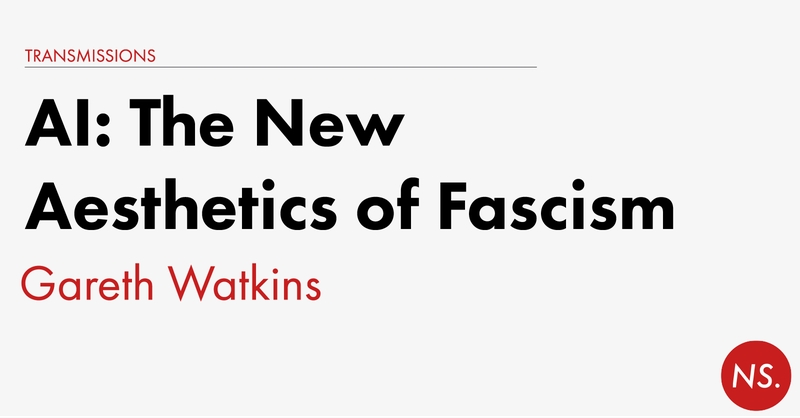
Watkins rebuts go-to critiques of AI, such as critiques of it’s produce as facile, meaningless, and incompetent, observing that that is exactly what appeals about AI art to the right wing.
If AI was capable of producing art that was formally competent, surprising, soulful, then they wouldn’t want it. They would be repelled by it.
Offering one way of possibly responding to this moment, Watkins says that:
If hurting and offending people is part of the point, then we can take that fun away from them by refusing to express hurt or offence, even if we feel it.
And while we’re talking about AI, I thought I’d share with you this interesting research from OpenAI about folks developing emotional dependence on LLMs like ChatGPT (not great).

I shared another link from Alexander Leon just a couple weeks ago and was delighted to read this latest entry to his blog, writing about our connection to queer ancestors and what they might think about us.
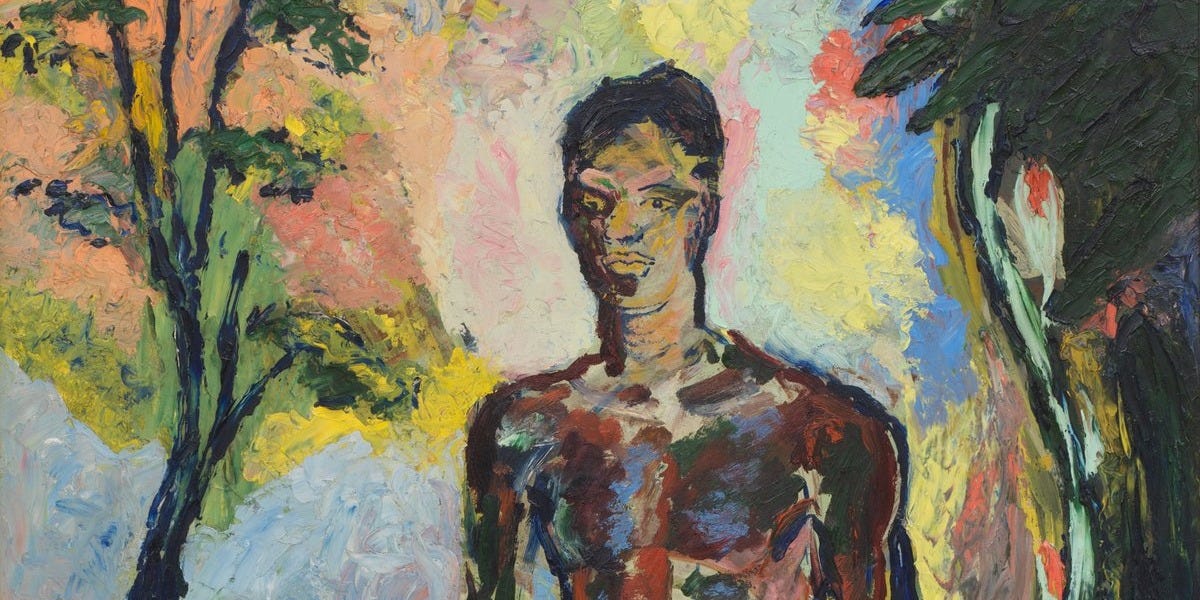
I imagine some took pleasure in dreaming up the existence of someone like me, exercising my brochure of freedoms. I imagine many didn't have the stomach to dream beyond the cessation of their immediate hardship.
Imagining the messages they might have for us today, Leon writes:
They have told me to be patient, that the shame dissipates at the rate that it was accrued, if I will let it. They have told me that queerness is an action, an experience in motion that requires congregation and moving in forward propulsion together.
I mean, god, don't you want to cry?

- A lovely essay about where all the ghosts went, ambiguity, or the limits of words to describe the world we’re living through.
- A review of a review of a recent immersive work in New York, exploring what prevents critics from truly emotionally connecting with the work they’re reviewing.
- This bittersweet article about the Munich Post, a newspaper which documented the rise of Nazism without normalising it—until the bitter end.

I don't think I've been making much of anything what with Comedy Fest raging, but my calendar begs to disagree.
I've begun working on applications for Melbourne Fringe where I'll be producing 2 (two!) shows this year (and taking a little break from making things myself). Very excited to tell you more about them when things are a little more locked in to place.
On Saturday I attended a close friend's birthday party/cabaret performance where every attendee has to perform a five minute set. I decided to perform a short excerpt of World Without Us by Ontroerend Goed about what might happen to the world if all the humans disappeared. A beautiful text for a lovely night.
On Sunday, Georgie and I sat down for some further writing on Sea Glint which we last came together to do a very early plot plan for. We've now got bits of dialogue for every scene at least planned and I think we're now ready to start actually writing the scenes—which should begin next weekend! Very keen to start loading this all into Instagram so we can start playing around with the chat bot and share little tests of it with you.

I’m scheduling to send this out on Tuesday morning by which point I’ll already have been to the Motley Bauhaus to see one more show for the week—out of a planned eighteen I’ve got scheduled to see before Sunday.
I truly truly truly implore you to watch something in MICF—there’s so much good sh*t on and this is such a good f*cking festival. You really gotta get amongst it my loves.


